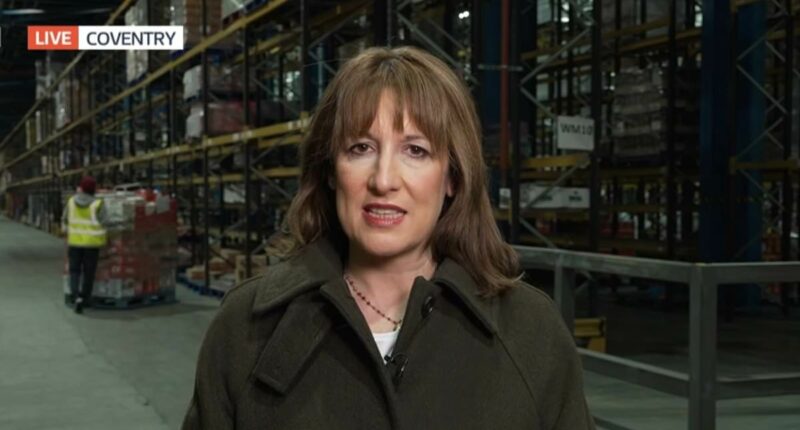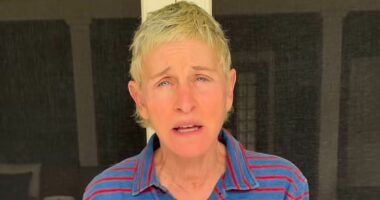Share this @internewscast.com
Rachel Reeves, faced with the challenging task of balancing fiscal responsibility and public spending, defended her decision to implement a significant £30 billion tax increase, describing it as the ‘absolute minimum’ necessary. Despite allocating substantial funds to welfare, the Chancellor emphasized that the tax hike was unavoidable.
Reeves explained that the Treasury’s assessment revealed a shortfall of £6 billion in public finances, compelling her to take decisive action. This decision comes amidst scrutiny and concerns about whether the measures align with Labour’s manifesto promises, with Reeves clarifying that the commitment in question pertained specifically to tax ‘rates’ rather than overall tax policy.
The newly announced fiscal measures include a contentious extension of the tax threshold freeze, set to last another three years. This move is projected to generate a staggering £12.7 billion, yet it has drawn criticism as it will result in a larger segment of the workforce falling into higher tax brackets. By the time the freeze ends, approximately a quarter of workers will be subject to higher or top rate taxes, a significant increase from the 15 percent affected when the freeze was first introduced in 2021.
Without this freeze, the threshold for higher rate taxes would have climbed to £70,370 by 2030, a substantial increase from the current £50,270, had it been adjusted for inflation. The decision highlights the government’s attempt to navigate the delicate balance between fiscal sustainability and economic fairness, even as it faces criticism from various quarters.
Around a quarter of the working population will be paying higher or top rate tax by then, up from just 15 per cent when it was imposed in 2021.
The higher rate threshold would have been £70,370 by 2030 instead of £50,270 if it had risen in line with inflation.

Chancellor Rachel Reeves said she ‘had’ to impose more pain on the country even though the Treasury’s own watchdog only told her there was a £6billion hole in the public finances
The tax burden is due to reach a new peak as a proportion of GDP in records that go back more than 300 years.
The Office for Budget Responsibility said economic growth under Labour would be even lower than forecast last year – and warned that none of the 88 measures unveiled by Ms Reeves would have a ‘material impact’ on boosting GDP.
The decision to spend £3billion a year axing the two-child cap was cheered wildly by Labour MPs.
But it will involve the taxpayer funding handouts worth thousands of pounds a year each to Britain’s biggest jobless families.
The OBR on Wednesday night warned that the largesse would result in a further 25,000 big families claiming benefits, at an estimated cost of £300million.
Overall welfare spending is forecast to be £16billion higher by 2030-31 than the watchdog thought as recently as March.
Alarmingly, annual spending on welfare per year is forecast to rise from £333billion in 2025-26 to £389.4billion in 2029-30.
The Tories condemned it as a ‘Budget for benefits street’ while Nigel Farage hit out at an ‘assault on aspiration’.
However, the measures have been welcomed by Labour MPs with ministers suggesting Ms Reeves has ‘saved her skin’.
In a round of interviews this morning, the Chancellor told GB News: ‘I did have to increase taxes yesterday, but I’ve kept them to an absolute minimum on ordinary working people, freezing those thresholds for an additional three years from 2028.’
Ms Reeves added: ‘This Government are backing aspiration.’
The Chancellor told Sky News that Labour was ‘very specific in the manifesto that we wouldn’t increase the rates of income tax, national insurance or VAT’.
She added: ‘But I do recognise yesterday that I have asked working people to contribute a bit more by freezing those thresholds from 2028.
‘I do recognise that will mean working people will pay a little bit more but I have kept that contribution to an absolute minimum by closing, as the IFS and the Resolution Foundation are saying, by closing a number of tax loopholes and also bearing down on government spending and waste and inefficiency.
‘And as a result, I have managed to keep that to an absolute minimum, but people recognise that public finances are under a lot of pressure.’
Ms Reeves said she was ‘not denying this has an impact on working people’.
‘But what we are doing is taking £150 of people’s energy bills next year, that is significant. That is the biggest challenge for people, and pensioners around the country,’ she added.
















